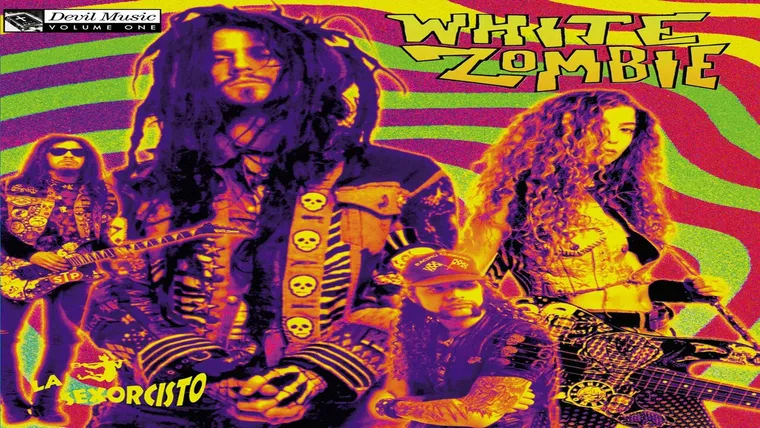Released on March 17, 1992, La Sexorcisto: Devil Music Vol. 1 was White Zombie’s third studio album and the record that catapulted them from underground cult status to mainstream recognition. Blending groove-heavy metal, industrial elements, psychedelic textures, and a deep love for horror and exploitation films, the album stood out as something unique in the heavy music landscape of the early ‘90s.
While bands like Metallica and Pantera were dominating with thrash and groove metal, and grunge was taking over the mainstream, White Zombie carved their own niche—one that was equally heavy, bizarre, and hypnotically danceable. The record was a sonic experience like no other at the time, filled with thunderous riffs, eerie movie samples, and Rob Zombie’s unmistakable, gravelly delivery.
Following 1989’s Make Them Die Slowly, which had a rawer, more noise-rock-inspired sound, La Sexorcisto saw White Zombie refining their identity, shifting toward a tighter, funk-infused groove metal style that would become their signature. The result was an album that not only brought them critical acclaim but also laid the groundwork for Rob Zombie’s future as a solo artist and filmmaker.
By the time La Sexorcisto was recorded, White Zombie had undergone a major transformation. Rob Zombie (vocals), Sean Yseult (bass), Jay Noel Yuenger (guitar), and Ivan de Prume (drums) had developed a chemistry that blended heavy metal with a deep rhythmic pulse, influenced by funk, industrial music, and horror aesthetics.
Speaking about the band’s evolution, Sean Yseult recalled:
“We had this weird, noisy punk-metal thing going on before, but it wasn’t really clicking. Once we found that heavy groove, it all came together. Suddenly, we had a sound that was uniquely ours.”
This shift in style was no accident. Guitarist Jay Noel Yuenger, who joined just before the album’s recording, played a crucial role in refining the band’s direction. His thick, chugging riffs and bluesy solos gave White Zombie’s music a more structured, infectious feel. Unlike their earlier material, which was chaotic and abrasive, La Sexorcisto was tight, precise, and full of undeniable hooks.
Rob Zombie himself reflected on this shift:
“We wanted something that was still heavy but had more movement to it—something you could actually groove to instead of just headbang.”
This groove-oriented approach, combined with spooky, grindhouse-inspired soundbites and apocalyptic imagery, gave White Zombie an aesthetic that was equal parts heavy metal, sci-fi horror, and psychedelic freak show.
The album was produced by Andy Wallace, whose previous work with Slayer and Nirvana made him a perfect choice to bring White Zombie’s strange, hypnotic sound to life. Wallace’s production gave the album a cleaner, punchier quality without stripping away the raw energy that made the band exciting.
Unlike their previous albums, which had a gritty, lo-fi quality, La Sexorcisto was polished yet still menacing, allowing every groove, sample, and screaming lyric to hit with full force. The result was an album that felt both cinematic and primal, like a demented B-movie playing at full volume in a haunted nightclub.
"Thunder Kiss 65"—the song that changed everything for White Zombie. Built on a hypnotic, blues-infused riff, the track was both heavy and strangely danceable, with Rob Zombie’s cryptic, snarled vocals giving it an eerie edge. When MTV picked up the song—and Beavis and Butthead gave it their sarcastic stamp of approval—White Zombie’s underground days were officially over.
Reflecting on its unexpected success, Rob Zombie said:
“We never thought it would take off like that. It was just another weird song to us, but suddenly, it was on MTV all the time, and people actually knew who we were.”
Though La Sexorcisto didn’t immediately explode upon release, it steadily gained momentum, eventually going double platinum. The success of "Thunder Kiss '65" and "Black Sunshine" helped White Zombie break into the mainstream, and by the mid-’90s, they were one of the most recognizable names in metal.
Reflecting on the album’s impact, Jay Noel Yuenger said:
“I don’t think any of us expected it to become as big as it did. We were just making something weird and fun that we liked, and somehow, it connected with people.”
In the years since its release, La Sexorcisto has been recognized as one of the defining albums of ‘90s metal, bridging the gap between classic heavy metal, industrial grooves, and horror-infused theatrics. Its unique mix of psychedelic weirdness, B-movie horror vibes, and infectious, headbanging rhythms ensured that it stood apart from the grunge explosion and heavier thrash acts of the time.
Even today, its influence can be heard in bands that blend metal with industrial, horror, and groove-driven elements. Without La Sexorcisto, it’s hard to imagine Rob Zombie’s solo career or the countless horror-metal acts that followed in White Zombie’s footsteps.
Final Verdict: 9/10
Standout Tracks:
- Thunder Kiss ‘65
- Black Sunshine (Intro by Iggy Pop)
- Welcome to Planet Motherfer / Psychoholic Slag*
- I Am Legend
- Grindhouse (A Go-Go)
With its massive grooves, horror-movie weirdness, and unrelenting energy, La Sexorcisto: Devil Music Vol. 1 remains a must-listen for any fan of heavy, groove-driven music. It’s an album that never takes itself too seriously, yet manages to be an absolute powerhouse of creativity and raw energy—a true classic of its time.
Until next time, play it loud, friends!

